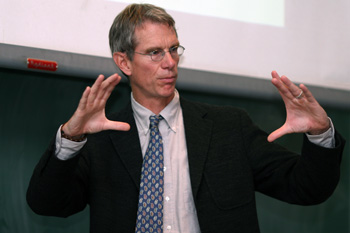Distinguished author and Professor of Classics and Political Science at Stanford University, Josiah Ober gave his lecture, "Choice, Knowledge, Commitment...and Democracy" to a packed crowd Monday night.
The lecture was the 2006 Brigance Forum Lecture jointly sponsored by the Rhetoric and Classics Departments. Dr. David Timmerman, Professor of Rhetoric began the evening by briefly describing the man the lecture was named after, the esteemed professor William Norwood Brigance. Professor of Classics Joe Day then took the podium to welcome the speaker of whose work he said demonstrates "acute observations about the way things were." Ober was described by Dr. Day as "walking historian and classicist" as well as a "student of political philosophy and political science."
 A tall man with a friendly demeanor, Dr. Ober took the podium to discuss a topic which weaved together Classics and Political Science. Or, as Dr. Day joked during his introduction, it demonstrated some practical advice that can be gleaned from the Classics.
A tall man with a friendly demeanor, Dr. Ober took the podium to discuss a topic which weaved together Classics and Political Science. Or, as Dr. Day joked during his introduction, it demonstrated some practical advice that can be gleaned from the Classics.
Dr. Ober’s presentation centered on the central question of whether a democracy was the best suited system to preserve liberties, while competing with other markets in other countries. In his opinion, the answer is a resounding yes. He listed assertions made by many political theorists regarding the nature of democracy including claims that democracies "further values of freedom, equality and dignity," as well as that they "promote tolerance for political dissent" among many others.
The key to really great democracies Ober shared, was that the "deliberative body is by its very nature self-correcting." As he stressed throughout his presentation, democracies are not simply "rule by the majority" but rather allow full civic participation for its members so that it can accurately represent its constituency.
One question Ober presented early on was, "Can democracies, by and for the people complete militarily and economically?" Not only did he again assert that they could, he suggested that one needed to only look at Athens to find such proof.
The examination of the ancient polis resulted in a discussion of network theory. The idea, explained Dr. Ober, was premised on the idea that "latent knowledge dispersed across the organization is hard to get at." Therefore democracies, when functioning at their optimum need to members with both strong network ties, close friend and family, and weak network ties, like acquaintances. It is only with the combination of the two that interconnected networks can grow and information can freely flow between a people.
Dr. Ober concluded his lecture and explanation of network theory by resolutely iterating that democracies, "can compete, when done right, with authoritarian regimes while preserving values we hold dear." And often, he admitted with a smile, it does a better job.
The Brigance Forum lecture is an annual public lecture or debate is endowed by the Brigance family, friends and former students in memory of the late William N. Brigance. During his time as a Wabash professor and chairman of the Speech Department (now known as the Rhetoric Department), Professor Brigance fostered a desire in students to be more effective in their speaking. He was also the creator of college’s Speaker's Bureau.